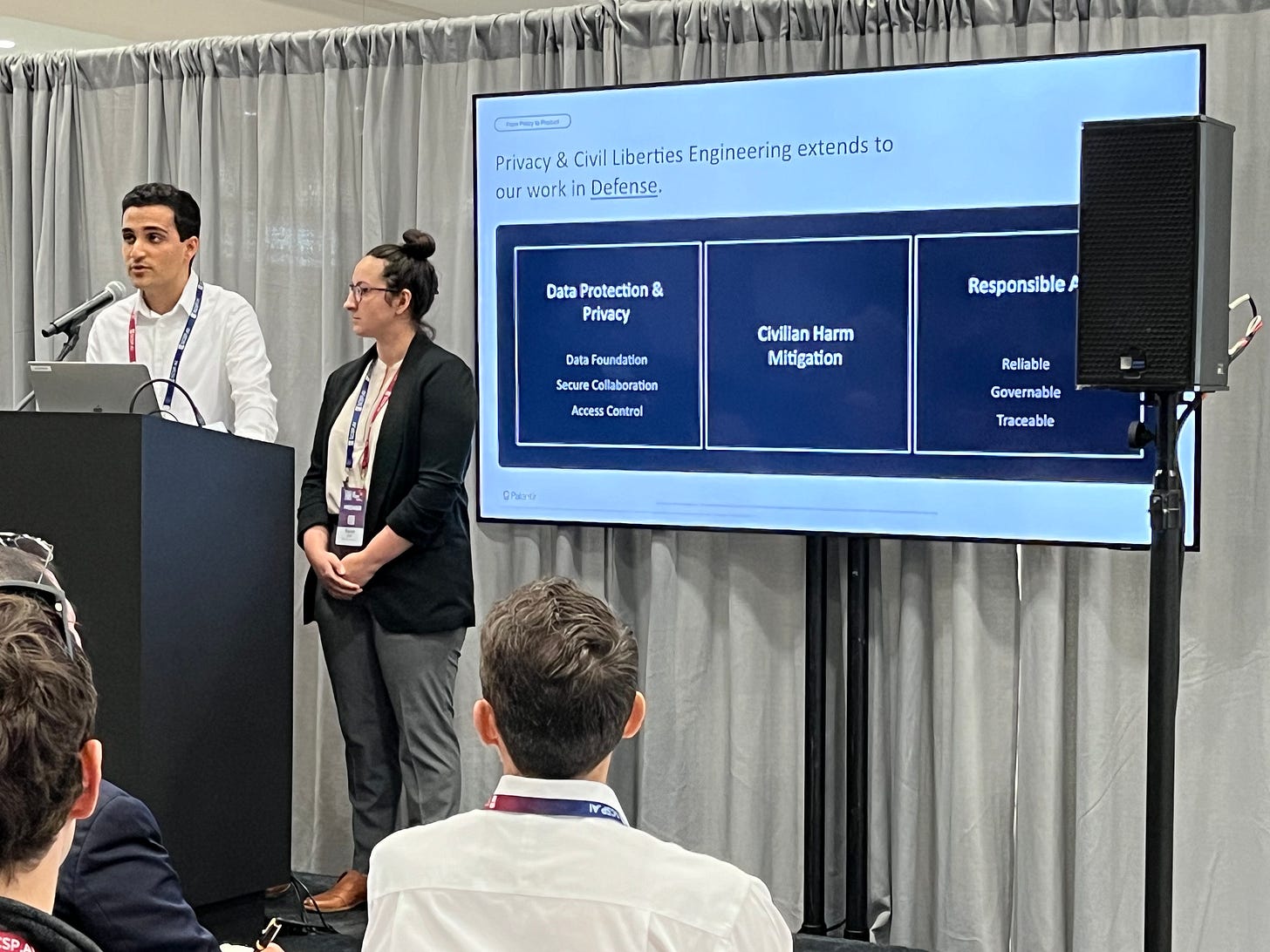U.S. tech industry gathers to organize against China, while defending its obscured role in ongoing slaughter of Gazans
Senior Western security officials and tech executives strategized on how to advance U.S. foreign policy through militarized artificial intelligence, including in the face of mass civilian casualties.

2024-06-10: The Special Competitive Studies Project posted the official video for the conversation between Palantir CEO Alex Karp, former Google CEO Eric Schmidt, former Chairman of the Joint Chiefs Mark Milley, and deputy CIA director David Cohen today, exactly one month after this article published.
The first Chief Technology Officer of the Central Intelligence Agency, former Silicon Valley executive Nand Mulchandani, declared in a panel on Wednesday on the main stage of the Walter E. Washington convention center in Washington, D.C. that: “The idea of Silicon Valley leaning into government and national defense, that’s done. I mean, I think that debate’s over.”1
Immediately before joining the U.S. spying agency, Mulchandani occupied a similar position within the Joint Artificial Intelligence Center (JAIC, pronounced “Jake”), the component of the Pentagon which led the widely discussed Project Maven, the pathfinder project of the so-called “Third Offset Strategy” of countering China through militarized artificial intelligence. Mulchandani’s tenure at the JAIC began one year after Google workers famously protested participation in Maven’s drone targeting program and ended as the center was integrated into the newly formed Chief Digital and AI Office (CDAO). “For me, the seminal event was sort of the Project Maven thing of like, Silicon Valley not wanting to work with Washington. That’s gone. That’s been long erased,” he stated.
Sitting next to CDAO deputy director Margeret Palmieri, Mulchandani added that: “for the vast majority of Silicon Valley, especially with Ukraine, Israel and these types of events, I think national defense and economic defense and technology are all now one thing. And I think everyone is leaning into it.”2 (In the last month, Google fired more than 50 workers for protesting its support for the Israeli military through a roughly $1.2 billion cloud contract shared with Amazon.)
On the same stage roughly one hour later, the runner-up for President Biden’s Secretary of Defense, WestExec Advisors co-founder Michèle Flournoy, argued that the relationship between U.S. tech companies and intelligence agencies had repaired since Edward Snowden’s revelations in 2013 of the National Security Agency’s large-scale domestic and foreign wiretapping.3 “We are way past the Snowden moment,” Flournoy noted. (The NSA would have its own small booth at the event, and its director of research, Gilbert Herrera, spoke remotely alongside Mr. Mulchandani.4)

Both panels took place on the second day of the AI Expo for National Competitiveness, an inaugural gathering of the leading Western commercial and government executives driving the militarization of artificial intelligence, with military and economic competition with China as the explicit raison d'être. Ten members of Congress would also speak at the event, including Senate majority leader Chuck Schumer through a 30 minute fireside chat, and the expo would be described by a Google Public Sector executive as the largest ever concentation of U.S. tech companies in D.C.
Hosted by former Google CEO Eric Schmidt’s Special Competitive Studies Project (SCSP), a privatized successor to the congressionally mandated National Security Commission on AI (NSCAI) which he also led, Schmidt would receive his own fireside chat with Foreign Affairs editor Daniel Kurtz-Phelan. And Schmidt would also have a seat on the flagship panel of the event, alongside Alex Karp, the provocateur CEO of data fusion giant Palantir, CIA deputy director David Cohen, and Mark Milley, a former Chairman of the Joint Chiefs of Staff.

Moderated by CNBC’s Andrew Ross Sorkin, Schmidt and Cohen were largely upstaged by a back-and-forth between Karp and Milley on both their long-term partnership in deploying Palantir within the U.S. military and the alleged existential importance of preventing university students from protesting the mass killing of civilians by U.S. and allied militaries. Roughly 19 minutes into the panel, Karp claimed that: “General Milley fought — has scars all over his body — just to get Palantir implemented.” “It’s true,” Milley quickly replied.

The audience soon after applauded Karp for claiming to be the only CEO of a publicly traded company to “stand up” against students protesting the Israeli military’s invasion of Gaza. Karp further noted that, years earlier, he: “stook up for the U.S. Government when it wasn’t popular in Silicon Valley. There were others, Eric [Schmidt] was always an ally in this. I humiliated Google when they walked away from Maven.”
“Honestly, if what happened to Israel happened to us, I think there would be a hole in the ground somewhere,” Karp stated, implying the U.S. would immediately respond with a genocidal strike. Milley later made a similar claim based upon a flawed translation of the roughly 1200 Israelis killed by Hamas on October 7 to the same percentage of the U.S. population: “If you take the math and do 1200 and apply it to the United States, that would be 50 to 100 thousand people dead in a morning. Can you imagine what we would do?”
(Using the World Bank’s 2022 population estimates for Israel and the United States of 9.56 million and 333 million, respectively, the overestimate of 1200 killed Israelis would correspond to roughly 41,800 Americans. A similar calculation using the U.S. Government’s mid-2022 estimate of Gaza’s population as 2 million would translate an estimate of 34,844 Gazans killed by the Israeli military since October 7 into roughly 5.8 million Americans. To provide a sense of scale, the Hamas killings in Israel would correspond to less than half of the population of Daly City in California, while the Israeli military’s killings in Gaza would constitute roughly 70% of New York City.)
Milley further justified Israel’s killing of more than 20,000 women and children in Gaza as no different from previous actions by the United States: “Before we all get self-righteous about what Israel’s doing, and I feel horrible for the innocent people in Gaza that are dying, but we shouldn’t forget that we, the United States, killed a lot of innocent people in Mosul, in Raqqa,” respectively referring to at least 3,200 civilians being killed by Iraqi and U.S.-led coalition forces in the battle against the Islamic State between October 2016 and March 2017, and more than 1,600 killed by US-led coalition strikes in Raqqa later that year.

Milley then continued: “We destroyed 69 Japanese cities, not including Hiroshima and Nagasaki. We slaughtered people in massive numbers. Innocent people who had nothing to do with their government. Men, women, and children. War is a terrible thing.” (According to the Bulletin of the Atomic Scientists, the U.S. killed somewhere in the ballpark of 150,000 Japanese citizens through the “Little Boy” and “Fat Man” nuclear weapons alone.)
Palantir’s CEO immediately followed Milley’s defense of the Israeli military by complaining that: “One of the things that I personally [find] very frustrating is, the peace activists are actually the pro-war activists, and we’re the peace activists. If you don’t want war, you have to be strong.” When asked by Sorkin to explain his logic, Karp argued that: “Because, if you’re the useful idiot of Iran and China … why would Hamas ever give up? They have you marching for them. They’re never going to give up. You are an infection inside of our society and [you] are the reason they’re not going to give up.”
Both Karp and Milley would connect the U.S. security state’s control over domestic narratives with the ability to continue fighting wars in the face of casualties. According to Karp: “We kind of just think these things that are happening across college campuses especially are like a side show. No, they are the show. If we lose the debate, we will not be able to deploy any army in the West, ever.”
One week before the conference, the New York Police Department arrested 109 students at Columbia University for protesting U.S. support for the ongoing Israeli invasion of Gaza. Karp would also brag that: “Palantirians will get a job in literally 30 seconds. Columbia grads, it’s going to be harder.”
An iron fist in a velvet glove
Despite both Milley and Karp defending the right of Western governments to slaughter civilians in response to attacks on their own citizens, relatively junior employees at Palantir presented on the company’s technology for “Civilian Harm Mitigation” during both days of the conference. Yet, when a manager demoing Palantir’s AI system for pairing weapons systems with military targets was asked how the system incorporated civilian harm into its optimization, they took the demo off screen.

The next day, the head of US Government Communications for Palantir, Morgan Gress Johnson, approached me as I passed through the company’s booth because she heard I was writing an article about Palantir. Despite giving me her card, Ms. Johnson would not comment in person or by email on claims from the Israeli news outlet Globes that Palantir had been rejected by Israel’s Military Intelligence Directorate. (According to the reporting, Palantir is providing logistical support through the broader Ministry of Defense, rather than supplying a targeting system to the intelligence directorate’s Unit 8200 — the country’s rough analogue of the NSA.)
Two separate human rights organizations attending the conference would decline to directly address Karp and Milley’s explicit justification for U.S. and Israeli war crimes: Switzerland’s International Committee of the Red Cross and the U.S. Government’s National Endowment for Democracy (NED). While formally neutral in order to preserve access to conflict zones, Sean Naylor reported in his book on the history of U.S. special operations, Relentless Strike, that SEAL Team Six posed as Red Cross personnel as part of its capture of Milan Kovacevic in Bosnia on July 10, 1997.

Roughly two hours after Karp and Milley’s remarks, NED hosted a panel asserting the need for the U.S. to “craft a democratic digital approach capable of overcoming authoritarian influences in the marketplace of ideas.” When asked whether the speakers had any comments on Karp and Milley’s explicit defense of American tech companies supporting allied militaries despite ongoing mass killings of civilians, the National Democratic Institute’s director of technology and democracy, Moira Whelan, stated that: “One of the reasons that I work for NDI is because I probably normally don’t agree with tech companies and how they make decisions and I like to be empowered to tell them.” The International Republican Institute’s director of technology and democracy, Jared Ford, did not provide a comment.

In response to a second question on whether American tech companies such as Palantir should be required to publicly disclose the type of support they are providing to militaries plausibly engaging in a genocide, Stefan Batory Foundation senior policy officer Krzysztof Izdebski noted the existence of South Africa’s “Global Principles on National Security and the Right to Information” — better known as the Tshwane principles. While not directly addressing whether Palantir should be required to disclose the level of its support for Israel’s ongoing mass killings, Izdebski noted that there is “a balance between freedom of information and security restrictions,” with his preference being that contracts “to the greatest extent, maybe not to the maximal extent, should be transparent.”
The only invocation of Israel’s name would come from Article 19 digital rights legal coordinator Priscilla Ruiz Guillen, who noted that military surveillance is “not only happening, for example, in Israel, it’s happening in all of Latin America and all of Central America.”
A revolving door by design
At the Center Stage during the second morning of the conference, public policy executives from Google Public Sector, OpenAI, and Anthropic came together under the thesis that: “The movement of talent in and out of government is vital for driving innovation and keeping the United States competitive globally.”
Each speaker was asked to open with an example of when their life felt like something “out of a movie,” with OpenAI’s Russian-born vice president of global affairs, former national security policy advisor Anna Makanju, noting that “a lot of the best ones are ones I can’t talk about.” The policy executive, who is also a board member of both Panera Brands and a cosmetics company, then answered: “when the Russian invasion happened, when I was actually able to, in real time, translate things for the president before we could get the CIA reports.”
(In response to an inaudible question from fellow panelist Joshua Marcuse, Google Public Sector’s head of strategic initiatives, Makanju noted that “I speak six [languages], but there are a few others I can understand fairly well.”)
Marcuse himself responded to the ‘movie’ question with three separate answers: “when I had to brief Secretary [of Defense] Mattis in my gym shorts, or when I got left behind in the motorcade on a nuclear sub base and was held at gunpoint by Marines. But, I would say a more serious answer would be … the DoD AI ethics principles, [and] they were [also] adopted by NATO.” The “serious” example would come from Marcuse’s time as the executive director of the Pentagon’s Defense Innovation Board under chairman Eric Schmidt, where, in response to protests in Google against Project Maven, he led the creation of a set of five ethical principles for the U.S. military’s adoption of AI. After drafting the principles, Marcuse was directly hired by Google Cloud in mid-2020.
Anthropic’s head of global affairs, Michael Sellitto, opened with an example of a TIME magazine article on “nuclear hotlines to exchange information with an adversary,” where he subsequently “realized, wait a minute, this is actually describing all of the stuff that I was doing.” Before leaving government, Sellitto advised current CIA director William Burns and Secretary of State Antony Blinken during their times as deputy secretaries of state.
Beyond noting that Google Public Sector has grown from roughly 200 to 1000 employees, Marcuse stated that “a Marine O-5 [Lt. Col.] is going to be joining us for a year starting this summer” and that, in the opposite direction, “We had our first Google engineer spend four months with the Air Force.” In context of these two-way exchanges, Marcuse argued that: “It takes a really savvy customer to buy the right products, and the best thing that we can do as an industry is help educate our customers so that they understand how to buy something as complex as a large language model from any of our companies.”
Marcuse subsequently demurred on a suggestion from the moderator that he might eventually become Secretary of Defense, but asserted that “I will definitely go back to government one day.” In response, Sellitto joked that “if he’s going to be Secretary of Defense, I want to be Secretary of State. Anna, maybe you could be National Security Advisor and tell both of us what to do.” “I just want to be Ambassador to France,” she retorted.
Throughout the two days of talks, journalistic inquiries in the realms of conflict of interest mitigation, core foreign policy orthodoxy, and the content moderation policies of corporate Large Language Models appear to have been rare, if not altogether nonexistent.
When queried by the author if the Chinese government has ever committed human rights violations, Google’s Gemini answered that the U.S. State Department has reported “Mass detention of Uyghurs and other Muslim minorities in Xinjiang,” while the human rights group Amnesty International has noted “Restrictions on freedom of expression and assembly.”
Unlike with China, Google Cloud works closely with the Computer Services Directorate of the Israeli military. And when asked if the Israeli government has ever committed human rights violations, Gemini punts with: “If you'd like up-to-date information, try using Google Search.”
As argued by Anthropic’s Sellitto during the panel: “Geopolitics is a tough needle to thread, but it doesn’t run through sticking your head in the sand.” The presentation from Palantir’s junior partner Primer on the company’s “Delta” intelligence product displayed a far more honest summary of the ongoing invasion of Gaza. Next to an apparent picture of the ongoing bombings, Delta noted that the International Court of Justice has conducted a hearing on allegations “that Israel is committing genocide.”
The arguable peak of Mulchandani’s entrepreneurship was his stint as CEO of OpenDNS from late 2008 to late 2009, during the time period that his new employer was being banned from torturing detainees. OpenDNS would be acquired by the Bay Area networking giant Cisco in 2015 for $635 million in cash, while Mulchandani was a vice president at virtualization company Citrix.
Ms. Palmieri’s boss, CDAO chief Radha Iyengar Plumb, spent much of the Trump administration working as a content moderation executive at Meta and then Google, and was quick to publicly meet with Beacon Global Strategies after assuming her current position in April. And Milancy Harris, acting Under Secretary of Defense for Intelligence, was chief of staff of the Facebook Oversight Board for much of 2020.
While WestExec reportedly refused to accept the now-sanctioned Israeli spyware firm NSO Group as a client, no such restraint was exercised by their consultant Daniel Shapiro, or by Beacon Global Strategies, whose co-founder Jeremy Bash moderated Ms. Flournoy’s panel.
Through the heavily editorialized moderation of Suzanne Kelly, the CEO of a newsletter and Western spymaster social network known as The Cipher Brief , the panel also remotely included David van Weel, the head of the North Atlantic Treaty Organization’s two primary technology incubation efforts (DIANA and the NATO Innovation Fund).


Psychopaths